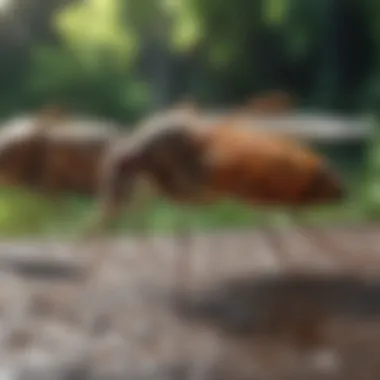Effective Strategies to Repel Mosquitoes Naturally


Intro
Mosquitoes are not just a nuisance; they are significant vectors for diseases and can impact our quality of life. Understanding effective strategies for repelling these pests becomes essential, particularly for homeowners and those managing family spaces. When tackling a mosquito problem, it’s crucial to identify common species, explore preventive measures, and consider various repellent methods available.
In this article, we delve into the common pests that invade our environments, effective prevention techniques, and eco-friendly pest control options. By providing a detailed exploration of these themes, readers will gain insights and practical knowledge to take effective control measures against mosquito populations.
Identification of Common Pests
Understanding the specific types of mosquitoes that may invade your space is an important first step in managing them effectively. Different species exhibit diverse behaviors and preferences, making targeted strategies crucial.
Description of Common Pests
The most common mosquitoes include the Aedes, Culex, and Anopheles species. Aedes mosquitoes are known for spreading diseases such as dengue and Zika, and they thrive in urban settings. Culex mosquitoes often appear in suburban areas and are known carriers of West Nile virus. Anopheles mosquitoes are primarily known for transmitting malaria.
Signs of Infestation
Recognizing the signs of a mosquito infestation can help you address the problem quickly. Look for:
- Increased mosquito bites during outdoor activities, especially at dawn or dusk.
- Presence of standing water in containers, gutters, or vegetation, as female mosquitoes require water to breed.
- Loud buzzing sounds, indicating their presence in indoor environments.
Identifying these signs promptly allows for timely intervention.
Prevention Techniques
Once you understand the common mosquito types, employing prevention techniques can significantly minimize their populations around your home.
Home Maintenance Tips
Maintaining a clean and uncluttered home environment is key. Here are essential tips to consider:
- Ensure garbage bins are tightly sealed to prevent breeding.
- Repair any leaks and remove standing water from indoor or outdoor areas.
- Use window screens to prevent mosquitoes from entering the home.
- Trim back overgrown vegetation where mosquitoes may hide.
Environmental Modifications
Environmental changes can also make your property less inviting for mosquitoes.
- Create a natural barrier using plants known to repel mosquitoes, such as citronella, lavender, and marigolds.
- Fill or drain water-collecting containers, like bird baths or clogged gutters, regularly.
- Install outdoor fans to create airflow, which can deter mosquitoes from hanging around.
Eco-Friendly Pest Control Options
For those who seek non-toxic methods of controlling mosquito populations without harmful chemicals, there are several eco-friendly pest control options available.
Natural Pesticides
Utilizing natural pesticides can be an effective solution. Some options include:
- Neem oil, derived from the seeds of the neem tree, disrupts mosquito reproduction.
- Essential oils, like eucalyptus and tea tree oil, can repel mosquitoes when used in diffusers or as topical applications.
Organic Pest Control Techniques
There are practical organic techniques that can assist in mosquito control. Consider:
- Introducing natural predators, such as bats and certain fish species, to help maintain the mosquito population.
- Utilizing homemade traps using sugar water and yeast to attract and trap mosquitoes.
By understanding these eco-friendly approaches, homeowners can actively participate in pest control while maintaining safe spaces for their families.
Understanding Mosquito Behavior
Understanding mosquito behavior is crucial for anyone looking to effectively manage and repel these pests. It involves recognizing the aspects of their life cycle and the various factors that draw them to humans and animals. Grasping these elements enables individuals to devise strategies that not only repel mosquitoes but also reduce their overall population around living spaces.


The Life Cycle of Mosquitoes
The mosquito life cycle includes four main stages: egg, larva, pupa, and adult. Each stage has specific requirements and habitats. The female mosquito typically lays her eggs in or near standing water, which is essential for larval development. During the larval stage, mosquitoes thrive in water, consuming microorganisms. After this, they transition into the pupa stage, which is a resting phase before emerging as adults.
Each phase can last anywhere from a week to several weeks, depending on environmental conditions like temperature and humidity. Therefore, eliminating standing water is key to interrupting the life cycle and preventing mosquito breeding.
Factors That Attract Mosquitoes
Mosquitoes are attracted to humans and other animals by various factors. Understanding these can aid in developing efficient repellents and preventive methods.
Body Heat
Body heat is a significant attractant for mosquitoes. They possess heat-sensing organs that enable them to detect warm-blooded creatures. The unique feature of body heat is that it varies from person to person, which can affect individual susceptibility to bites. Those who naturally generate more heat may find themselves more frequently targeted.
However, this aspect can be leveraged to one's advantage. By wearing lighter clothing that does not trap heat, individuals can help reduce their attractiveness to these pests.
Carbon Dioxide Emission
Carbon dioxide emission is another critical factor. Mosquitoes are notorious for being drawn to the carbon dioxide that humans exhale. This is particularly prominent in breaths that occur during physical activity. The primary characteristic of carbon dioxide emission is its consistency; everyone emits it, making this a universal factor for attraction. While we cannot change our biology, moderate any strenuous activities or limit the co2 output by minimizing rapid movements outdoors during peak mosquito activity times can be useful.
Body Odor
Body odor is largely influenced by individual skin chemistry and bacteria present on the surface. Specific substances, such as lactic acid, play a major role in attracting mosquitoes. The key characteristic of body odor is its variability; some people attract mosquitoes more than others due to their unique scents. This variability allows for targeted strategies. For example, using unscented hygiene products can minimize attractiveness, while applying certain scents may act as deterring agents.
Understanding these components of mosquito attraction allows us to formulate comprehensive strategies to create a less inviting environment for these pests. Not only does it enrich our knowledge, but also helps in effectively implementing measures that can ultimately lead to a significant decrease in mosquito activity.
Chemical Repellents
Chemical repellents play a crucial role in the fight against mosquitoes. They offer a practical solution for preventing bites during outdoor activities or even in indoor settings. The effectiveness of these products can significantly reduce mosquito-related discomfort and the risk of diseases such as West Nile virus or Zika virus. Understanding the various chemical options available helps individuals make informed choices based on their needs and preferences.
DEET: An Overview
Effectiveness
DEET, known scientifically as N,N-Diethyl-meta-toluamide, is a widely recognized insect repellent. Its effectiveness comes from its ability to interfere with the mosquitoes' ability to sense humans. DEET remains effective for several hours, making it a popular option for those who spend time outdoors. A key characteristic of DEET is its concentration level, which can vary from 5% to 100%. Generally, higher percentages offer longer protection. However, while DEET is highly effective, it is important to note that it may cause skin irritation for some individuals, making a patch test advisable.
Usage Guidelines
Proper application of DEET is essential for maximum effectiveness. It should be applied to exposed skin and clothing, avoiding areas around the eyes and mouth. Notably, products with a concentration of 30% are often found to be sufficient for most activities. Additionally, DEET should not be used on children under two months. A unique advantage to consider is that DEET can be used in various formulations, including sprays and lotions. However, it is advised to wash off the repellent after returning indoors, to minimize prolonged skin exposure.
Picaridin: A Suitable Alternative
Picaridin has emerged as an effective alternative to DEET. It is similar in effectiveness and duration of protection, but it offers a different profile regarding skin sensitivity. Users often report that Picaridin has a lighter feel on the skin without the characteristic odor of DEET. This makes it a favorable option for those who are concerned about strong scents or skin reactions. The protection duration can last several hours, making it suitable for daytime use in areas with high mosquito populations.
IR3535: A Lesser-Known Repellent
IR3535 is another repellent option that is less commonly known but still effective against mosquitoes. This chemical is derived from amino acids and has a good safety profile, which appeals to consumers looking for gentler products. Users of IR3535 report its effectiveness, though it may not offer as long-lasting protection as DEET or Picaridin. The application is straightforward, but it may require more frequent reapplication when spending extended time outdoors. This repellent is particularly useful for those with sensitive skin who need to manage mosquito bites effectively.
Natural Repellents
Natural repellents offer effective solutions for mosquito control with minimal environmental impact. Their importance lies in providing alternatives to chemical-based products, appealing to those who prefer using ingredients derived from nature. Such options often have fewer side effects and are less harmful to wildlife, making them an attractive choice for many households.
In consideration of efficacy, natural repellents can match or even exceed some synthetic counterparts, particularly when used correctly. However, it's essential to note that while they can be effective, their durability and strength may vary compared to chemical repellents. This means that users might need to reapply more frequently. Understanding the specific natural repellents available empowers individuals to make informed decisions suitable for their situations.
Essential Oils as Mosquito Deterrents
Essential oils are commonly used as natural repellents due to their strong aroma and properties that irritate mosquitoes. These oils are often concentrated extracts, derived from plants, and can effectively reduce mosquito presence.
Lemon Eucalyptus Oil


Lemon eucalyptus oil is notable for its high effectiveness among natural repellents. It contains a compound called PMD, which is responsible for its mosquito-repelling properties. This oil is a popular choice in this article due to its proven efficacy, comparable to DEET in some studies. Its lemony scent is refreshing and often makes it a preferred option for outdoor activities.
"Lemon eucalyptus oil provides a strong, natural alternative to synthetic repellents, especially in outdoor environments."
The main advantage of this oil is its natural origin, reducing concerns people may have about chemicals. However, it is important to ensure it is diluted properly before applying to the skin to avoid irritation.
Lavender Oil
Lavender oil is well-known for its calming fragrance, but it also serves as a natural mosquito repellent. Its soothing scent tends to repel not only mosquitoes but also other insects. The relaxing scent makes it a popular choice in aromatherapy, enhancing its appeal for use both indoors and outdoors.
One key characteristic of lavender oil is its dual functionality; it can repel mosquitoes while also providing aromatherapeutic benefits. However, its effectiveness may not be as pronounced as stronger oils, necessitating more frequent application to maintain protection.
Peppermint Oil
Peppermint oil is another effective natural repellent, known for its strong and minty scent. This oil tends to be very popular due to its availability and familiar fragrance. Its active compounds can irritate mosquito sensory receptors, making it an excellent deterrent.
The distinctive freshness is a significant benefit, as many individuals enjoy its aroma. However, just like with other essential oils, it is crucial to dilute peppermint oil before skin application to prevent any skin irritation, especially on sensitive skin.
Vinegar: A Household Solution
Vinegar, specifically apple cider vinegar, is often touted as a household remedy for many issues, including mosquito repellent. Its use stems from its strong odor, which mosquitoes may find unappealing. While personal application of vinegar is not as common due to its scent, it can be beneficial when used as a surface spray. Mixing it with water and spraying around the home can help deter mosquitoes.
Some people apply apple cider vinegar internally, believing it helps change body smell to be less attractive to mosquitoes. However, science does not fully support this claim, and more research is needed in this area. Nevertheless, vinegar is a cost-effective and easy approach to discourage mosquitoes from frequenting your space.
Garlic as a Repellent
Garlic is another natural option seen as effective against mosquitoes. Its strong scent is what repels these insects. Many people consume garlic for its health benefits, but when applied externally, it can also fend off mosquitoes. The sulfur compounds in garlic are particularly effective.
Some suggest eating garlic regularly can enhance the body's odor to repel mosquitoes, although this is anecdotal. External applications include making a garlic spray by blending garlic cloves with water. While its effectiveness can vary, many house owners find comfort in using garlic, given its widespread availability and low cost.
Using natural repellents can provide a robust strategy in managing mosquito populations around homes. Essential oils, vinegar, and garlic present flexible options that can cater to diverse preferences and settings.
Physical Barriers
Physical barriers are critical in the fight against mosquitoes. These barriers help prevent mosquitoes from reaching people while allowing air and light to circulate. Such methods are essential, especially for those living in areas prone to mosquito-borne diseases. The effectiveness of these strategies lies in their ability to create a protective zone without relying on chemicals or traps, making them a safe choice for families.
Screening Windows and Doors
Screens for windows and doors serve as a simple yet effective solution to keep mosquitoes outside. Using fine mesh screens can block even the smallest mosquitoes while allowing fresh air into the home. This method can be particularly useful during warm months when windows may be left open for ventilation.
However, one should ensure that screens are properly fitted. Gaps and holes can provide entry points for mosquitoes. Regular maintenance checks for tears or weaknesses are advisable. Sealing any openings around windows and doors adds an extra layer of protection. Also, using self-closing mechanisms on doors helps in reducing the risk of mosquitoes entering when people come and go.
Netting: A Practical Solution
Netting is another practical approach to mosquito control. It is versatile and can be used in various settings, including patios, sleeping areas, and outdoor dining spaces. It creates a physical barrier that is highly effective when properly installed.
Types of Mosquito Nets
Various types of mosquito nets are available on the market. Some notable types include:
- Bed Nets: These are specifically designed to be hung over beds, typically treated with insecticides for enhanced effectiveness. They significantly reduce the likelihood of bites during the night.
- Canopy Nets: Suitable for outdoor areas, these mesh tents provide protection without obstructing airflow. They are beneficial for outdoor events like barbeques.
- Portable Nets: These can be easily set up and taken down, making them ideal for camping or travel.
The key characteristic of these nets is their efficacy in offering coverage against mosquitoes. Bed nets are especially popular due to their dual functionality as both protective barriers and sleeping aids. However, they may require regular washing and retreatment to maintain effectiveness.
Installation Tips
Proper installation of mosquito nets is vital for their effectiveness. Here are some tips that can make the process easier:
- Selecting the Right Size: Measure the area where the net will be installed to ensure a proper fit. It should drape over the sides sufficiently to avoid gaps.
- Secure Attachment: For bed nets, attaching to the ceiling allows the net to hang freely and keeps it taut. Utilize hooks or adhesive strips designed for this purpose.
- Creating a Seal: Netting should be tucked in or secured to prevent any openings. For canopy nets, ensuring that the ground layer is tightly secured can limit entry points.


Being mindful of these details can greatly improve the overall effectiveness of mosquito netting solutions.
Environmental Controls
Environmental controls play a crucial role in repelling mosquitoes. These strategies focus on modifying the environment to reduce mosquito breeding and their attraction to human habitiats. Understanding the environment where mosquitoes thrive is essential in creating effective repelling methods. This section discusses two key elements: removing standing water and maintaining landscape hygiene. Implementing these environmental strategies provides long-term benefits for mosquito management.
Removing Standing Water
Mosquitoes breed in stagnant water. Even small amounts, such as those found in flower pots, birdbaths, or clogged gutters, can create ideal breeding sites. Removing standing water is one of the most effective ways to control mosquito populations. This involves regular inspection of your property and eliminating any areas where water may accumulate.
- Check gutters and drains for blockages.
- Empty containers that collect rainwater.
- Change water in birdbaths at least once a week.
- Ensure pools are maintained and treated.
By addressing these areas, home owners can significantly decrease mosquito breeding sites, leading to lower mosquito populations.
Maintaining Landscape Hygiene
Maintaining a tidy landscape is equally important. Mosquitoes are drawn to overgrown areas, where they find shelter and host animals. Hence, regular upkeep of yards and gardens helps to create an inhospitable environment for them. Effective landscape hygiene involves two main tasks: grass and shrub maintenance, and identifying attractive plants.
Grass and Shrub Maintenance
Regular mowing and trimming of grass and shrubs are vital for controlling mosquito habitats. Tall grasses and thick shrubbery provide mosquitoes with protection from sunlight and predators.
The key characteristic of grass and shrub maintenance is keeping vegetation well-trimmed. This practice makes the area less inviting for mosquitoes. It is a beneficial choice as it does not just control mosquitoes but also enhances the overall appearance of the yard.
However, it's important to consider that vigorous maintenance might require time and effort, especially for larger properties. Ensuring a balance between aesthetics and pest control is crucial for homeowners looking to create a mosquito-free environment.
Identifying Attractive Plants
Some plants attract mosquitoes more than others. Understanding which plants draw these pests can help in managing your landscape effectively. Common plants that may attract mosquitoes include those with high moisture content and sweet scents.
The distinctive feature of identifying attractive plants is that it allows homeowners to modify their landscaping choices strategically. By removing or relocating certain plants, the risk of attracting mosquitoes can be reduced. This is a popular choice among home owners keen on pest management strategies.
However, this strategy may impact the garden’s overall biodiversity and aesthetics. Balancing plant selection with functional repelling strategies requires careful consideration.
Innovative Mosquito Control Solutions
Innovative mosquito control solutions are critical in the fight against these nuisances. Unlike traditional methods, which often rely on chemical repellents or simple physical barriers, these strategies incorporate modern technology and ecological awareness. This section dives into methods with a focus on sustainability while still being effective. Utilizing innovative solutions may provide better long-term results and contribute to an overall healthier ecosystem.
Mosquito Traps: Efficacy and Types
Mosquito traps have become a popular option for controlling mosquito populations. These devices lure mosquitoes using various attractants, such as carbon dioxide or light. Once the mosquitoes come close, traps either capture or kill them. The efficacy of these traps can vary based on their design and the type of attractants used.
Common types of mosquito traps include:
- CO2 Traps: Use carbon dioxide to mimic human breath, which attracts mosquitoes. Effective but may require regular maintenance.
- Ultraviolet Light Traps: Draw in mosquitoes with UV light and then trap them on adhesive surfaces. Good for indoor use.
- Fan Traps: Employ strong fans to suck mosquitoes into a collection container. Suitable for outdoor spaces.
When selecting a trap, consider the area you want to cover and the specific species of mosquitoes in your region. Heavy infestations may require multiple traps or a combination of traps for effectivity.
Biological Controls Using Predators
Biological controls offer an eco-friendly alternative for mosquito management. This approach uses natural predators, which help keep mosquito populations in check. Such methods reduce dependency on synthetic pesticides, which can have harmful environmental effects.
Fish Species That Consume Larvae
Certain fish species are effective at controlling mosquito larvae. For instance, Gambusia affinis, commonly known as the mosquito fish, is a well-known choice. These fish consume large quantities of mosquito larvae, helping reduce their population before they become adults. Their ability to thrive in both small and large bodies of water makes them versatile for residential ponds or larger water features.
A key characteristic of mosquito fish is their rapid reproduction, which allows for effective population management of mosquitoes. However, one must be aware of potential ecological impacts, such as introducing a non-native species into local waterways.
Beneficial Insects
Beneficial insects also play a role in biological mosquito control. Species such as dragonflies and damselflies are natural predators of adult mosquitoes. They are essential to other ecological functions, including pollination.
The main advantage of using beneficial insects is their natural presence in habitats that provide balance. However, establishing a habitat that attracts these predators may require time and care. Creating a diverse garden that supports various species can lead to better natural pest control.
By understanding and applying innovative mosquito control solutions, you can foster an environment that not only keeps mosquitoes at bay but also promotes ecological health.







